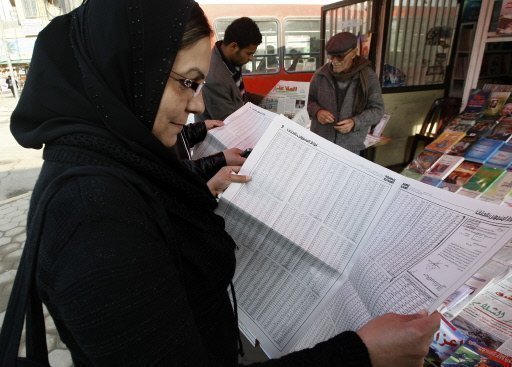
On arrival Biden was briefed by Ambassador Christopher Hill and General Ray Odierno, the top US officer in Iraq. He was due to meet Prime Minister Nuri al-Maliki and President Jalal Talabani on Saturday.
A senior Biden aide told reporters the vice president was not in Iraq to offer solutions to the dispute that has seen more than 500 candidates banned from the March 7 poll, but would give his advice if asked.
"If whatever process is agreed to is fair, if its procedures are transparent, then there should not be a problem," Tony Blinken, Biden's national security adviser, told reporters.
"The problem only arises if there is a perception that the process is unfair and lacks transparency and that as the result of an unfair process people may be disqualified that should not be."
Biden's first meeting on Saturday will be with the UN secretary general's special representative for Iraq, Ad Melkert.
He will then meet Maliki, Talabani, parliament speaker Iyad al-Samarrai, several government ministers and a cross section of other political leaders.
The blacklist of 511 candidates said to have links with the executed dictator's regime has stoked tensions between the Shiite majority now leading the government and the Sunni Arab former elite.
Saleh al-Mutlak, a leading Sunni MP and persistent critic of Maliki's Shiite-dominated government, is among those who have been barred. But Maliki has denied that Sunnis were being targeted ahead of the election.
Ahead of Biden's trip, Iraqi Foreign Minister Hoshyar Zebari stressed its importance and told AFP the vice president was here "to salvage the electoral process".
"If there are delays in publishing the final candidates' list, it will affect the US (withdrawal) process also," he said.
Blinken, however, said the timeline for the US withdrawal -- all combat troops are scheduled to leave the country by August ahead of a complete military pullout in 2011 -- "remained on track".
The election row sparked a flurry of contacts by Biden in recent days aimed at brokering a compromise, notably through Talabani, who is a Kurd.
Biden "proposed that the disqualifications be deferred until after the election and that those candidates who have been barred condemn and disavow the Baath party and undertake to act through democratic means," Talabani said.
Elections chief Faraj al-Haidari told AFP more candidates could yet be barred from the ballot, with the defence and interior ministries publishing lists naming individuals "who have criminal records or false diplomas".
Biden has repeatedly voiced concern about lingering feuds between Iraq's Shiite, Sunni and Kurdish communities causing obstacles to political progress.
On Friday Iraq's government said the disqualified candidates would have to denounce Saddam's regime and its crimes in order to reintegrate into society, without specifically offering reinstatement on ballot papers.
"The Baathists... must declare their innocence and condemn the crimes and failings of Saddam Hussein's regime and the Baath party," government spokesman Ali al-Dabbagh said.
-----------------------------------------------------------------------------------
A senior Biden aide told reporters the vice president was not in Iraq to offer solutions to the dispute that has seen more than 500 candidates banned from the March 7 poll, but would give his advice if asked.
"If whatever process is agreed to is fair, if its procedures are transparent, then there should not be a problem," Tony Blinken, Biden's national security adviser, told reporters.
"The problem only arises if there is a perception that the process is unfair and lacks transparency and that as the result of an unfair process people may be disqualified that should not be."
Biden's first meeting on Saturday will be with the UN secretary general's special representative for Iraq, Ad Melkert.
He will then meet Maliki, Talabani, parliament speaker Iyad al-Samarrai, several government ministers and a cross section of other political leaders.
The blacklist of 511 candidates said to have links with the executed dictator's regime has stoked tensions between the Shiite majority now leading the government and the Sunni Arab former elite.
Saleh al-Mutlak, a leading Sunni MP and persistent critic of Maliki's Shiite-dominated government, is among those who have been barred. But Maliki has denied that Sunnis were being targeted ahead of the election.
Ahead of Biden's trip, Iraqi Foreign Minister Hoshyar Zebari stressed its importance and told AFP the vice president was here "to salvage the electoral process".
"If there are delays in publishing the final candidates' list, it will affect the US (withdrawal) process also," he said.
Blinken, however, said the timeline for the US withdrawal -- all combat troops are scheduled to leave the country by August ahead of a complete military pullout in 2011 -- "remained on track".
The election row sparked a flurry of contacts by Biden in recent days aimed at brokering a compromise, notably through Talabani, who is a Kurd.
Biden "proposed that the disqualifications be deferred until after the election and that those candidates who have been barred condemn and disavow the Baath party and undertake to act through democratic means," Talabani said.
Elections chief Faraj al-Haidari told AFP more candidates could yet be barred from the ballot, with the defence and interior ministries publishing lists naming individuals "who have criminal records or false diplomas".
Biden has repeatedly voiced concern about lingering feuds between Iraq's Shiite, Sunni and Kurdish communities causing obstacles to political progress.
On Friday Iraq's government said the disqualified candidates would have to denounce Saddam's regime and its crimes in order to reintegrate into society, without specifically offering reinstatement on ballot papers.
"The Baathists... must declare their innocence and condemn the crimes and failings of Saddam Hussein's regime and the Baath party," government spokesman Ali al-Dabbagh said.
-----------------------------------------------------------------------------------









 Home
Home Politics
Politics









